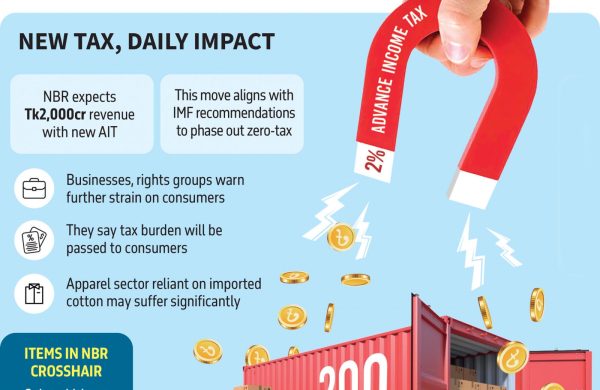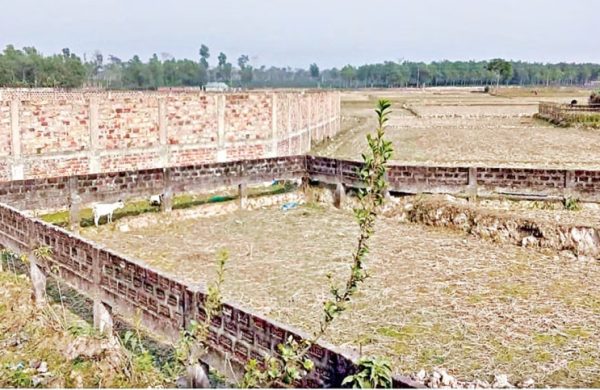NBR plans advance tax on 200 duty-free imports
- Update Time : Monday, May 12, 2025

Food, fertilisers, raw materials:
Staff Correspondent:
In a move poised to disrupt supply chains and drive up costs, the National Board of Revenue (NBR) plans to impose a 2% Advance Income Tax (AIT) at the import stage on around 200 previously tax-exempt products.
The measure, aimed at phasing out exemptions and boosting tax compliance, is expected to generate an additional Tk2,000 crore in revenues.
BROAD IMPACT ON KEY SECTORS
Among the affected items are crucial raw materials for Bangladesh’s apparel industry, including cotton and man-made fibers. Essential food staples such as potatoes, onions, lentils, chickpeas, soybeans, and maize, along with fertilisers, crude oil, sugar, and medical equipment, also fall under the new tax scope. Electronics and industrial machinery—including computer printers, routers, modems, aircraft engines, and buses—may also be affected.
BUSINESS LEADERS AND CONSUMERS RAISE RED FLAGS
While the NBR argues the tax will enhance compliance and broaden the revenue base, business groups and consumer rights advocates warn of severe consequences. Many fear rising production costs, inflationary pressures, and a potential squeeze on industries already grappling with economic challenges.
A senior NBR official, speaking on condition of anonymity, “Currently, there is no AIT at the import level on about 200 tariff lines. As part of our exemption phase-out plan, we intend to impose AIT on almost all of these items, except perhaps one or two.”
He said a final list expected following a high-level meeting later this week. “The plan has already been discussed with the finance adviser.”
EXPERTS AND INDUSTRY VOICES SPEAK OUT
Economic analysts warn that AIT in Bangladesh rarely stays confined to importers—instead, it is typically passed on to consumers. Mustafizur Rahman, distinguished fellow at the Centre for Policy Dialogue (CPD), argues that vital goods, especially food and industrial raw materials, should remain exempt.
Echoing these concerns, SM Nazer Hossain, vice president of the Consumers Association of Bangladesh, cautions that this tax could exacerbate the cost-of-living crisis, worsening financial strain on households. “People are already under immense pressure—tax hikes on basic commodities will only deepen their hardship,” he stated.
Entrepreneurs say tax refunds are rare in practice, leaving businesses with no choice but to either raise prices or absorb financial losses. Saleudh Zaman Khan Jitu, managing director of NZ Group, estimated that for his company alone, a 2% AIT on Tk300 crore worth of raw materials would translate to an extra Tk6 crore in costs, posing a direct threat to business viability.
WHAT’S NEXT?
The proposed tax extension also covers medical equipment, industrial chemicals, airplanes, buses, imported fish and meat, as well as networking devices and printer accessories. Policymakers cite IMF pressure as a key reason for moving away from zero-tax regimes.
With Bangladesh’s textile sector heavily reliant on imports, business leaders urge the government to focus on growth-driven policies rather than burdening industries with additional costs. Showkat Aziz Russell of the Bangladesh Textile Mills Association (BTMA) called for long-term support for manufacturers, arguing that sustainable industry expansion would boost employment and tax revenue more effectively than punitive measures.
Jitu warned that Bangladesh’s policy climate is increasingly hostile to business, especially when compared to India’s proactive industry support. “The past three years suggest a deliberate effort to undermine the textile sector. If this continues, many businesses will simply shut down,” he warned.


















